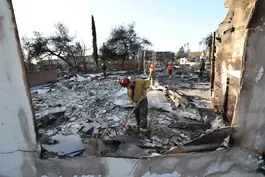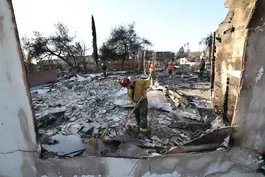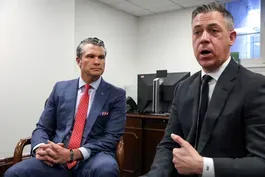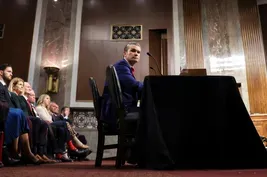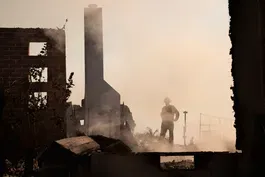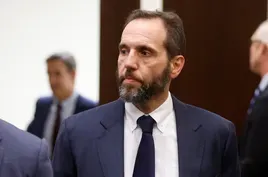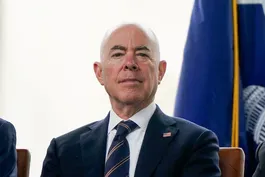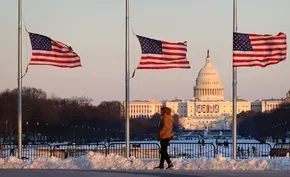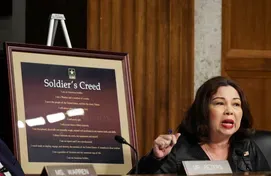
January 14, 2025 - PBS News Hour full episode
1/14/2025 | 57m 46sVideo has Closed Captions
January 14, 2025 - PBS News Hour full episode
January 14, 2025 - PBS News Hour full episode
Major corporate funding for the PBS News Hour is provided by BDO, BNSF, Consumer Cellular, American Cruise Lines, and Raymond James. Funding for the PBS NewsHour Weekend is provided by...

January 14, 2025 - PBS News Hour full episode
1/14/2025 | 57m 46sVideo has Closed Captions
January 14, 2025 - PBS News Hour full episode
How to Watch PBS News Hour
PBS News Hour is available to stream on pbs.org and the free PBS App, available on iPhone, Apple TV, Android TV, Android smartphones, Amazon Fire TV, Amazon Fire Tablet, Roku, Samsung Smart TV, and Vizio.
Providing Support for PBS.org
Learn Moreabout PBS online sponsorshipAMNA NAWAZ: Good evening.
I'm Amna Nawaz.
GEOFF BENNETT: And I'm Geoff Bennett.
On the "News Hour" tonight: Surging winds fuel the Los Angeles wildfires that have been blazing for a full week.
What the scope of destruction means for homeowners and home insurance.
AMNA NAWAZ: Lawmakers grill secretary of defense nominee Pete Hegseth on his opposition to women in combat roles and accusations of financial mismanagement and sexual misconduct.
PETE HEGSETH, U.S. Defense Secretary Nominee: It was fully investigated and I was completely cleared.
SEN. MAZIE HIRONO (D-HI): I don't think completely cleared is accurate.
GEOFF BENNETT: In his final report, special counsel Jack Smith says Donald Trump would have been convicted for election subversion had he not been reelected.
GEOFF BENNETT: Welcome to the "News Hour."
Unprecedented warnings about wind conditions have residents around Los Angeles on high alert again tonight, while firefighters work to control major blazes that have destroyed communities and taken at least 24 lives.
AMNA NAWAZ: More than 40,000 people have applied for FEMA assistance already.
Los Angeles Mayor Karen Bass issued an executive order to remove red tape and speed up rebuilding efforts.
And Governor Gavin Newsom suspended state rules to make it easier for students to attend school in a different location because of the fires.
But, as Stephanie Sy reports, for the moment, it's hard for many residents to look beyond the next 24 hours.
KRISTIN CROWLEY, Los Angeles City, California, Fire Chief: Life-threatening and destructive and widespread winds are already here.
STEPHANIE SY: Even as firefighters continue to battle blazes in Altadena and the Pacific Palisades, the weary residents of Los Angeles are bracing for another 24 hours of dangerous fire conditions.
Strong Santa Anas, combined with extremely dry weather and vegetation, could shape another perfect storm.
Fire officials say they're in position and ready for any fresh fires, as well as flare-ups of the Palisades and Eaton fires, which have been burning for a week.
KRISTIN CROWLEY: For this significant wind event, we are taking an aggressive lean-forward posture and the LAFD has staffed all available resources, strategically placing fire patrols and engines in the unimpacted high fire risk areas in the city.
STEPHANIE SY: In Ventura County, some 60 miles northwest of Los Angeles, a new blaze exploded overnight.
The Auto Fire burned through this agricultural area in the dry riverbed town of Oxnard.
The Ventura Fire Department said it managed to stop it in its tracks.
But nearby residents were prepared with go-bags packed.
JIM KELLER, California Resident: We have been monitoring the fires every day, viewing the Cal Fire map, wind speeds, wind direction, trying to assess whether we're in particular danger for the day or not.
STEPHANIE SY: Back in L.A. County, gale-force winds reached upwards of 50 miles per hour.
Forecasters say that's strong enough to blow still-smoldering embers miles beyond the fire lines.
When they can take off, aircraft are blasting hard-to-reach canyons with hot pink flame retardant.
On the ground, firefighters are removing brush, trees or anything that could act as tinder.
The efforts have kept the already historic infernos at bay for the past two days.
KAREN BASS (D), Mayor of Los Angeles, California: The massive, massive destruction is unimaginable until you actually see it.
STEPHANIE SY: L.A. Mayor Karen Bass, who has faced criticism over funding for the fire department and being away when the fires broke out, said she assessed the damage on an aerial tour.
KAREN BASS: It's one thing to see it on television.
It's another thing to see it from air.
While we're preparing for the next couple of days, we also want to move into the time when we prepare for moving forward and rebuilding, but making sure that we can get people's lives back and whole.
STEPHANIE SY: Before they can rebuild, more than 88,000 Angelenos remain evacuated, many unsure how much has been lost or saved.
Officials say evacuation orders will remain in place until conditions are safe.
For thousands, including Brentwood resident Aviva Copaken, the road ahead is difficult to contemplate.
AVIVA COPAKEN, California Resident: My landlord tries to update us every day, and he's been saying that it definitely could change.
If it does change, I actually don't know where I would go, to be honest.
Like, I don't have family here.
I have friends, but they're all affected.
So I don't have a set plan in mind, and it's terrifying.
STEPHANIE SY: Let's hear more about the challenges so many are facing, this time from a member of our extended family.
Special correspondent Marcia Biggs lives in Malibu and had to evacuate last week.
She's been staying at a hotel and is now with a friend.
Marcia Biggs, thank you so much for joining the "News Hour."
It must be an unimaginably difficult time for you and your community.
And I know you have been back to your neighborhood.
So, just start by describing what you have seen.
MARCIA BIGGS: So, I'm lucky because I have a press pass and I'm able to get through.
Most of my neighbors, all of my neighbors have not been able to get in.
And I have taken videos for my neighbors and tried to get into their homes if I have keys or door codes and get what they need.
So I think what is really tough for people right now is just not knowing.
They can see on the map, they can see from footage, news footage, satellite imagery that their house is intact.
But they haven't been able to lay eyes on their homes.
And that is, I think, one of the most frustrating parts right now, as we just wait.
Those that have lost their homes are now trying to figure out how to go forward.
But in terms of my house, I am one little area of a block that was untouched, and everything else around is burned.
I mean, that's across the street.
That's incredible.
It was so fast.
I grabbed my dog, my computer, my passport, a necklace of my mom's, and I got out.
I don't know how we got so lucky.
I am beyond grateful, beyond grateful and relieved, because I also had my insurance canceled.
But it's really hard to be happy when you know everybody is struggling and is dealing with utter devastation.
STEPHANIE SY: The pictures that you sent us, it was like everything around you was ash, but your apartment building somehow remains intact.
I mean, can you even see yourself living in a place where everything around you is gone?
MARCIA BIGGS: I mean, that part is really hard and I think that that's what everybody is dealing with.
And that's, I think, what's so heartbreaking is, what we loved about this area is the community.
And it's really hard to imagine going home to a graveyard.
I mean, it's not a graveyard in the sense that people died, thank God, but it's charred remains of a life.
It's also -- this scope, I think, is hard for people to understand.
Like, everything that we know, everything that we do in our daily lives is now gone.
The grocery store, the pharmacy, the dry cleaner's, the coffee shop, the place we go for brunch on Sundays, the farmers market, all my friends' kids schools, the Palisades Rec Center where they would do sports, it's all gone.
So what I'm sort of struggling with, I mean, it's easier for me because I'm a single person, but what my friends are struggling with, with kids and families is, what do we kind of rally around?
What's that one singular thing that all these families can cling to?
And it's a difficult struggle, because there's really nothing left.
STEPHANIE SY: Looking ahead, they're starting to talk about recovery.
What does recovery look like to you in your community?
MARCIA BIGGS: I can't think that far.
I don't know.
STEPHANIE SY: You can't think that far.
MARCIA BIGGS: I think that's so many years ahead that I can't even imagine it yet.
STEPHANIE SY: Marcia Biggs, I'm so sorry for the losses in your community, but I'm glad you're OK.
Thank you so much for joining us.
MARCIA BIGGS: Thank you.
AMNA NAWAZ: With thousands of homes and buildings burned down, many expect the catastrophe to be one of the most costly natural disasters in American history.
Months before the fires, several insurers, including State Farm and Allstate, decided to leave the state or cancel thousands of home insurance policies, especially in fire-prone areas like the Pacific Palisades and Altadena.
Amy Bach, the executive director of a consumer advocacy group, United Policyholders, says homeowners now are just struggling to figure out what they need to do at a time when the market has been so chaotic.
AMY BACH, Executive Director, United Policyholders: What people seem to be worried about most, number one, is, how long is it going to take me to get the money from my insurance company that I need?
How am I going to pay for my temporary rent?
Are they going to pay for that?
And is it going to be a fight to get what I'm entitled to?
So I think people are wondering if they should be loaded for bear, ready for a fight, or whether their insurer is going to step up and treat them fairly right out of the gate.
AMNA NAWAZ: Joining me now to look at this is Jake Bittle, staff writer at Grist and author of "The Great Displacement: Climate Change and the Next American Migration."
Jake, welcome to the "News Hour."
Thanks for joining us.
JAKE BITTLE, Author, "The Great Displacement: Climate Change and the Next American Migration": Thanks for having me.
AMNA NAWAZ: So, even before these 2025 wildfires, you saw insurers scrapping thousands of policies, limiting coverage in fire-prone areas.
What was prompting them to do that?
What's behind that?
JAKE BITTLE: Yes, so, basically, for a long time, the state of California had limited the amount that insurance companies could charge to their customers.
And as fire damages kept going up and the insurers had to pay out billions of dollars in claims, especially in 2017 and 2018, the companies basically became convinced that they couldn't make money or enough money doing business in California.
So, instead, they started to limit their exposure to the state.
So, in the 2017 and 2018 fire seasons, they lost decades of underwriting profits when those big fires hit Northern California.
And they basically just said, OK, we have got to get back out of here if we can't charge more money.
AMNA NAWAZ: There is this state-backed system, right, the California FAIR Plan.
It's supposed to be a last resort for homeowners who can't get insurance coverage through other means.
How many people use that plan?
And how does that compare to the private insurance?
JAKE BITTLE: Yes, so it's still a minority of all customers in California.
It's about, I believe, 500,000 -- or it's probably tripled over the past couple of years to about 500,000.
And it's growing still as companies drop more policies.
Most people don't have to use it, but the people who do have to use it really don't like it because it's really expensive and it's not very good coverage.
And if your home is really valuable, it doesn't give you full coverage.
So people really are dissatisfied when they have to go on this plan, but it's growing pretty fast.
AMNA NAWAZ: So you mentioned the state setting these rules that limited what insurance companies could charge.
We should point out the California state insurance commissioner has now changed those rules.
So insurers can set higher premiums after big disasters.
What's likely to be the impact of that?
Is that actually going to help homeowners?
JAKE BITTLE: Yes, I mean, I think that's the big question, right?
So the deal that the state struck with insurers over the past year was, all right, we will let you charge a lot more money and in exchange you will stay in these disaster-prone areas and you won't pull out and leave the state.
And then insurers said, OK.
So, in theory, they're going to charge a lot more money to a lot of their customers over the next year as they start to renew policies, especially in fire-prone areas.
I think the question is, are there insurers going to hold to the deal that they made with the state not to pull out, right?
Because the worst-case scenario is not only do they get to charge a lot more money, but they also aren't offering coverage in these really fire-prone areas.
So I think that's the big question.
And the worst-case scenario is pretty bad.
AMNA NAWAZ: We're looking at losses in like the tens of billions here potentially or more.
What is going to happen to those people who don't have any kind of coverage?
Is the federal government going to step in?
I mean, what are their options?
JAKE BITTLE: Yes, I mean, it's a really tricky situation, right?
The federal government does provide some temporary displacement aid or help to replace certain contents from your home if you don't have insurance.
But if you're underinsured, right, like if you have a certain insurance policy, but it won't cover the cost of rebuilding your home, what I have seen in past wildfires is that people just basically have to go somewhere else, right?
Like, they take the money that they can get and they buy a home in a cheaper area or maybe they rent somewhere, maybe they leave the state.
So I think when you have a gap between the insurance coverage that people have and what they need to rebuild, which you're going to see all over L.A., I think, that's when you start to get this kind of displacement effect where people just enter this chaotic housing market and maybe have to leave the specific neighborhood that they were in before.
AMNA NAWAZ: It can't be sustainable to keep and sustain the insurance market in crisis like this, right?
There's always going to be more disasters.
There's likely more wildfire events ahead too.
So what kind of solutions are being considered to fix this?
Are there any real proposals on the table?
JAKE BITTLE: Yes, I mean, I think that the sort of consensus solution, which is just really hard to implement, is, you can't just keep throwing money at a problem where the risk is just continuing to go up, or you have to do something to mitigate the actual risk of fire, right?
And so it's, since it's really, really hard, as Los Angeles has learned, to stop the ignition of fire and to stop fire from spreading.
The best thing you could probably do is reduce the risk to the homes themselves, right?
Like, we know how to build homes that are relatively resilient to fire.
We know how to build homes that don't catch on fire.
And we know how to design urban spaces that fires done spread as easily.
The problem is, that stuff's not exactly cheap and it's hard to convince existing homeowners of decades' old homes to spend tens of thousands of dollars retrofitting their homes, when they may never think that it's going to be necessary, right?
So I think that's the big question is how do you take this housing stock, which was built over the course of the 20th century, built millions of homes in vulnerable areas, and transition it to one that's more resilient without putting a huge additional cost burden on homeowners?
AMNA NAWAZ: All right, that is Jake Bittle, staff writer at Grist, joining us tonight.
Jake, thank you so much.
Good to speak with you.
JAKE BITTLE: Thanks.
GEOFF BENNETT: We start the day's other news in South Korea, where a chaotic scene is unfolding at the presidential residence in Seoul.
Investigators arrived in the early morning hours in a second attempt to detain impeach President Yoon Suk Yeol.
They want to question him about his declaration of martial law last month.
It's part of an investigation into whether his actions amounted to rebellion.
Surveillance camera footage shows the scene, with Yoon's supporters gathered in the alley on the left and anti-Yoon protesters on the right.
A prior effort to serve an arrest warrant on Yoon failed earlier this month.
Here in the U.S., House Speaker Mike Johnson says that flags at the U.S. Capitol will fly at full height during next week's inauguration of Donald Trump.
Late last month, outgoing President Joe Biden ordered that flags be flown at half-staff for 30 days to honor the passing of President Jimmy Carter, in keeping with federal flag code.
That time frame includes Monday's inauguration.
President-elect Trump expressed frustration over that, even flying flags at full staff at his home in Mar-a-Lago.
In a social media post, Speaker Johnson said the flags will be lowered back to half-staff the following day to continue honoring President Jimmy Carter.
Also on Capitol Hill today, the House passed a bill that would bar transgender athletes from competing on girls' school sports teams.
MAN: On this vote, the yeas are 218.
The nays are 206.
One voted present.
The bill is passed.
GEOFF BENNETT: The Protection of Women and Girls in Sports Act passed with the support of every Republican, plus two Democrats.
It's one of the first measures put forward by this new Congress, and it comes after a campaign season that saw Republicans often speaking out against transgender athletes in sports.
The bill is expected to go on to the Republican-led Senate next, where its fate is uncertain.
Ukraine targeted Russia overnight with several U.S.-made missiles and carried out one of its largest drone attacks to date.
Ukrainian forces reportedly launched more than 140 drones at areas near the border and well beyond, including the region of Saratov, where eyewitness video caught an oil refinery that went up in flames.
Ukraine's Security Service says it also hit a munitions storage facility in that region.
Russia's Defense Ministry responded by saying the attacks will not go unanswered.
NATO is launching a new mission to protect underwater sea cables in the Baltic Sea region.
Secretary-General Mark Rutte says the mission will be called Baltic Century.
It will employ ships, planes and naval drones to monitor the waters for suspicious activity amid concerns over Russian sabotage and spying.
It comes after a string of recent incidents where undersea cables supplying power, telecommunications and gas were damaged.
Speaking alongside the leaders of Finland and Estonia today, Rutte noted that the cables are a strategic imperative.
MARK RUTTE, NATO Secretary-General: Safeguarding our infrastructure is of utmost importance.
Ship captains must understand that potential threats to our infrastructure will have consequences, including possible boarding, impounding and arrest GEOFF BENNETT: The group also took aim at Russia's so-called shadow fleet.
Those are aging tankers that Moscow allegedly uses to dodge Western sanctions on the nation's energy sector.
NATO members said they pose a threat to the region's security and help fund Russia's war against Ukraine.
President Biden signed an executive order today aimed at building up the nation's artificial intelligence infrastructure and the energy needed to power it.
The order directs the Departments of Defense and Energy to lease federal sites to private companies to build A.I.
data centers.
It also requires those companies to use clean energy resources to power them.
And it promises to streamline the process by fast-tracking permits and connecting sites to the electric grid.
President Biden says such steps are meant to build the next generation of A.I.
in a way that enhances economic competitiveness, national security, A.I.
safety, and clean energy.
On Wall Street today, stocks ended mixed after a reassuring report on wholesale inflation.
The Dow Jones industrial average added more than 200 points, or about half-a-percent.
The Nasdaq fell around 40 points, as investors continued to sour on tech stocks.
The S&P 500 managed a slight gain on the day.
And in Northern India, what's described as the world's largest religious gathering is under way.
The Hindu festival of Maha Kumbh Mela draws millions of worshipers from across India and beyond.
Holy men smeared with ash rode on chariots today as part of a march to the confluence of three sacred rivers.
The faithful believe that a dip in the waters will cleanse them of their sins and end the cycle of reincarnation.
The festival takes place every 12 years.
More than 400 million Hindus are expected to take part over the next six weeks.
Still to come on the "News Hour": we speak to Republican and Democratic senators about the nominee for secretary of defense; hopes rise for a cease-fire in Gaza as negotiations enter final stages; and Homeland Security Secretary Alejandro Mayorkas discusses the Biden administration's legacy.
AMNA NAWAZ: One of president-elect Trump's most controversial nominees was the first to face the scrutiny of a Senate confirmation hearing.
A new PBS News/NPR/Marist poll set to be released tomorrow finds that Pete Hegseth, the nominee to lead the Department of Defense, has room to introduce himself to the country; 55 percent of Americans don't know enough about him to have an opinion, 19 percent hold a favorable view of him, and 26 percent have a negative impression.
GEOFF BENNETT: The nominee was questioned today about alleged sexual and financial misconduct, as well as a concern that he lacks the experience to manage the Defense Department's more than three million employees.
Hegseth has denied any wrongdoing.
Congressional correspondent Lisa Desjardins reports now on how Hegseth handled the hearing room spotlight.
AUDIENCE: USA!
USA!
USA!
LISA DESJARDINS: Supporters chanted as the defense secretary nominee took the hot seat.
PETE HEGSETH, U.S. Defense Secretary Nominee: When President Trump chose me for this position, the primary charge he gave me was to bring the warrior culture back to the Department of Defense.
LISA DESJARDINS: For Pete Hegseth, that means blocking diversity programs that conservatives challenged.
PETE HEGSETH: The dumbest phrase in military history is, our unity is our strength.
No, our shared purpose is our strength.
LISA DESJARDINS: Republicans see it as raising standards.
SEN. ERIC SCHMITT (R-MO): You are a breath of fresh air.
LISA DESJARDINS: But Democrats see a nominee who has repeatedly questioned women's rules in the military, including in a podcast about two months ago.
PETE HEGSETH: I'm straight up just saying we should not have women in combat roles.
It hasn't made us more effective.
LISA DESJARDINS: At the hearing today with two women senators who served in the military, strong pushback.
SEN. KIRSTEN GILLIBRAND (D-NY): You will have to change how you see women to do this job well, and I don't know if you are capable of that.
SEN. JEANNE SHAHEEN (D-NH): Mr. Hegseth, should we take it to believe that you believe that the two women on this committee who have served honorably and with distinction made our military less effective and less capable?
PETE HEGSETH: Senator, I would like to clarify.
When I'm talking about that issue, it's not about the capabilities of men and women.
It's about standards.
LISA DESJARDINS: Hegseth has Ivy League diplomas and has multiple tours in the military.
He has led small veterans groups, but nothing larger.
Most recently, he's been a co-host on FOX News.
If confirmed, Hegseth would head the largest agency in the federal government.
Committee Chair Roger Wicker praised him as unconventional.
SEN. ROGER WICKER (R-MS): That may be what makes Mr. Hegseth an excellent choice.
LISA DESJARDINS: But Democrats decried him as lowering standards for the top defense job.
SEN. MAZIE HIRONO (D-HI): I hardly think you are prepared to do the job.
LISA DESJARDINS: Hegseth focused on his leadership skills and vision.
PETE HEGSETH: I want smarter and more capable people around me than me.
And you will get that at the department.
LISA DESJARDINS: But Democratic senators raised other concerns, past affairs and reports of Hegseth being falling-down drunk at work events.
PETE HEGSETH: A small handful of anonymous sources were allowed to drive a smear campaign.
LISA DESJARDINS: Democrats pointed out it was not all anonymous.
They said some eyewitnesses to drinking have given their names and: SEN. TIM KAINE (D-VA): So, you acknowledge that you cheated on your wife and that you cheated on the woman by whom you had just fathered a child.
LISA DESJARDINS: Adultery is illegal under the Uniform Code of Military Justice.
Hegseth repeatedly did not comment when asked to deny or explain many accusations.
But he did reject allegations that he sexually assaulted a woman in 2017.
Hegseth reached a settlement, including a nondisclosure agreement with the woman.
PETE HEGSETH: Senator, I was falsely accused in October of 2017.
It was fully investigated, and I was completely cleared.
SEN. MAZIE HIRONO: I don't think completely cleared is accurate.
LISA DESJARDINS: Of all the senators asking Hegseth questions, one is the most pivotal to his fate.
SEN. JONI ERNST (R-IA): We have had very frank conversations.
Is that correct, Mr. Hegseth?
PETE HEGSETH: Senator, that is a correct characterization.
LISA DESJARDINS: Iowa Senator Joni Ernst, the first female combat veteran elected to the Senate.
She's also a rape survivor.
And to move forward, Hegseth needs her support, which she has not yet clearly given.
Hegseth is unlikely to get Democratic votes.
He declined to meet with most of them.
The Republican chairman of the committee has helped him, blocking access to his FBI background check for most senators.
President-elect Trump has a unique vision for the military, including it as part of his plans for mass deportation and other policies.
Hegseth was asked if a president's orders could ever be unconstitutional.
PETE HEGSETH: Senator, anybody of any party could give an order that is against the Constitution or against the law.
LISA DESJARDINS: Hegseth questioned if Trump would ever do that, but he didn't answer about how he would respond if it happens.
SEN. ROGER WICKER: This hearing is adjourned.
LISA DESJARDINS: For the "PBS News Hour," I'm Lisa Desjardins.
AMNA NAWAZ: And joining me now to discuss today's confirmation hearing is Republican Senator Jim Banks of Indiana, who serves on the Senate Armed Services Committee and was in the room today.
Senator, welcome to the "News Hour."
Thanks for joining us.
SEN. JIM BANKS (R-IN): Good to be with you.
AMNA NAWAZ: So Mr. Hegseth faced some pretty tough questions today on the past allegations of excessive drinking, his infidelity, and judgment, management inexperience.
How do you think he handled those questions today?
SEN. JIM BANKS: I thought the hearing went exceptionally well for Pete Hegseth.
The Democrats were looking for a gotcha moment, and they were trying to land a blow.
But they couldn't do it because they keep manufacturing and repeating anonymous sources and allegations.
And at the end of the day, we walked out of the room, and I thought Pete, who had momentum going into the hearing, had even more momentum coming out of it.
It went very well for him.
He focused on the issues, why it matters that we send a secretary of defense who's serious about preparing to fight and win wars to be the next secretary, why Donald Trump picked him to do that.
And I think he picked up even more support in the room after the hearing.
I'm looking forward to us moving quickly to confirm him on January 20 and send him to the Pentagon to do his job.
AMNA NAWAZ: As you have seen, several senators have very plainly they don't believe Mr. Hegseth has the experience to do this job.
His management experience is limited to a couple of small nonprofits.
Why do you believe that that lack of experience isn't an issue here?
SEN. JIM BANKS: Well, keep in mind, those were partisan attacks.
The Democrats on the committee in the minority, they were the ones that were repeating these anonymous allegations.
So -- and Mr. Hegseth addressed each and every one of them.
AMNA NAWAZ: Senator Banks, there's nothing anonymous about the fact that he's run two small nonprofits.
I'm just asking about his management experience here.
SEN. JIM BANKS: What he did at the pro-veteran organizations is very important, advocating for our post-9/11 veterans.
And he did it very effectively on Capitol Hill.
He was a big part of President Trump's pro-veteran initiatives in his first term.
But even on top of that, and Pete Hegseth talked about this in the room, he led hundreds of troops into battle, both in the Army Reserve in Iraq.
He served in the National Guard.
He served in Afghanistan like I did.
He led troops into battle.
And, to me, that's an incredible experience that prepares him to be a very good secretary of defense.
Keep in mind, he has two Bronze Stars.
He's decorated as a combat veteran.
He's well-equipped to do this job, and he will do it a lot better than the current guy who's in the role today.
AMNA NAWAZ: You have mentioned as well -- and we should point out you're a combat veteran as well.
Mr. Hegseth has said in the past very clearly that he does not support women in combat.
He has changed his stance since he was nominated.
I want to ask why you think he changed his mind, and do you believe him now?
SEN. JIM BANKS: Well, I would say, rather, he clarified his remarks and talked about the importance of having strong standards.
We shouldn't water down standards for those who go to combat.
AMNA NAWAZ: Senator Banks, all due respect, he said very clearly there's no place for women in combat, and now has now changed it to say there is a place, given that they meet certain standards.
SEN. JIM BANKS: And, today, he clarified those comments and talked about the importance of standards, as well as in recruitment.
We have the biggest recruitment crisis in the 50 years of an all-volunteer force.
And we shouldn't be lowering the standards for those who go into combat.
That's what Pete Hegseth articulated today about women in combat.
He talked about the important role that women play in our military.
I served in Afghanistan with a lot of remarkable women who did extraordinary things downrange in Afghanistan.
And Pete did as well.
And he articulated that very well today.
AMNA NAWAZ: You know, the rape allegation from 2017 also came up, that one that Mr. Hegseth paid to settle.
You may have seen there's now new reporting in "The New Yorker" from Jane Mayer, citing three sources, that says senators, including Joni Ernst and Susan Collins, turned down offers to hear privately from Hegseth's accuser.
I'm just asking, would you want the chance to meet with that accuser privately to be able to see through your due diligence in this advice-and-consent role?
SEN. JIM BANKS: Again, it's unfortunate that we would deal with anonymous allegations and sources.
If these people want to come forward and publicly make those claims, they would be much more credible and taken more seriously.
But that hasn't happened.
And the Democrats and the committee repeated these anonymous allegations today.
I can't speak to other senators and who they have heard from.
AMNA NAWAZ: Senator Banks, if I may, to clarify, I'm asking if you would meet privately with this woman who was behind the accusation in 2017.
SEN. JIM BANKS: Sure.
But no one has reached out to me to do that.
And at this point, we need to get Pete Hegseth on the job in the role as the secretary of defense to clean up the mess over the last four years.
And that's why I fully support his confirmation.
AMNA NAWAZ: That's Republican Senator Jim Banks of Indiana joining us tonight.
Senator, thank you for your time.
We appreciate it.
SEN. JIM BANKS: Thank you.
AMNA NAWAZ: In his final report to the attorney general, special counsel Jack Smith stood behind his decision to criminally charge president-elect Trump for his efforts to overturn the 2020 election.
In the 137-page report, Smith again detailed the evidence that he and his team amassed and would have presented at trial, writing -- quote -- "But for Mr. Trump's election and imminent return to the presidency, the office assessed that the admissible evidence was sufficient to obtain and sustain a conviction at trial."
The report was written before Smith resigned from the Department of Justice last week.
Our William Brangham has been following all the criminal investigations into the president-elect and joins us now.
So, William, this is Jack Smith saying he's confident that he could have convicted Trump, but he was blocked by this longstanding DOJ policy that prohibits the prosecution of a sitting president.
What else did he have to say in the report?
WILLIAM BRANGHAM: That's right, Amna.
We should also say, federal prosecutors always say, as a general rule, that, if we could have gone to trial, we would have been able to convict the defendant.
I mean, federal prosecutors, by their nature, do not indict people they do not have a great deal of confidence that they could win against.
But, that said, this report is really a summary and a sort of encapsulation of all the evidence that his indictments have shown over the last year.
There's nothing really new in here.
They're simply alleging that Donald Trump knew that the 2020 election was lost, that Joe Biden beat him, that there was no widespread fraud, and that he refused to accept those results.
And Smith writes; "Trump then engaged in an unprecedented criminal effort to overturn the legitimate results of the election in order to retain power."
And this report, those many, many pages detail all the ways that we have talked about over the past year that Trump allegedly unlawfully tried to stay in power.
That was pressuring state and local elections officials.
That was pressuring Department of Justice officials.
That was creating this fake electors scheme, pressuring Mike Pence, culminating, of course, with what Smith alleges was, Trump's campaign of lies of a stolen election is what drove that violent horde into the Capitol on January 6, where 140 law enforcement officials were savagely beaten and attacked.
And, again, as you said, Jack Smith says all of that evidence, if I had been able to present it in court, would have been persuasive.
But because Trump won and the DOJ doesn't prosecute a sitting president, that case and all of that evidence got dropped.
AMNA NAWAZ: And, William, Mr. Trump tried to block this report from coming out, from being released.
Last night, he criticized that release.
He called Jack Smith a lamebrain prosecutor.
And all along, Donald Trump has basically alleged this was a political Democratic effort led by President Biden to, in his words, weaponize the Justice Department against him.
Did Jack Smith address any of that?
WILLIAM BRANGHAM: Yes, he did.
In fact, he reiterated this quite a bit in his report.
Smith goes to great lengths to reject that allegation, writing -- quote - - "Nobody within the Department of Justice ever sought to interfere with or improperly influence my prosecutorial decision-making."
Smith writes throughout that the decision in this case, in all of them, was his and his alone.
He writes: "The ultimate decision to bring charges against Mr. Trump was mine.
It is a decision I stand behind fully."
On the issue that President Biden himself was somehow the puppet master in all of this, Smith says: "For anyone who knows me, they know that that idea is, in a word, laughable."
AMNA NAWAZ: So, William, this report covered the January 6 investigation, but there was another investigation by Jack Smith that was into Mr. Trump's alleged mishandling of classified documents at his Mar-a-Lago estate.
That is not in this report.
Will we ever see that volume?
WILLIAM BRANGHAM: That volume, it's complicated.
That case, as you remember, was dismissed by the judge, that she argued that Jack Smith was improperly appointed to his position.
That report has been written.
It is with the Department of Justice, but the department has said they're not going to release it publicly at least until the cases involving two of the other defendants in that case are finished.
So maybe we will see it.
We don't know.
It won't be any time soon.
AMNA NAWAZ: All right, our William Brangham, thank you so much.
WILLIAM BRANGHAM: Thanks, Amna.
GEOFF BENNETT: Let's return now to the confirmation hearing today of secretary of defense nominee Pete Hegseth.
Amna spoke earlier with Republican Senator Jim Banks.
And, for another perspective, we're joined now by Democratic Senator Tammy Duckworth of Illinois, who also serves on the Senate Armed Services Committee.
Thank you for being with us.
You were one of the Democratic senators today who confronted Pete Hegseth for his past comments opposing women serving in combat roles.
Today, he argued that his critiques were actually tied to instances where he says he saw standards lowered.
How did you interpret that explanation?
SEN. TAMMY DUCKWORTH (D-IL): Well, it doesn't hold any water because the standards have not been lowered.
The standards are the standards.
And, frankly, he tried to make today's hearing about whether or not women are qualified to serve in combat, when really today's hearing was about whether or not Pete Hegseth is qualified to be secretary of defense.
And he couldn't even answer the most basic questions I asked of him, like name a country that's in ASEAN, one of the most significant economic alliances in the Indo-Pacific.
And he couldn't even mention a single one.
So Pete Hegseth could do all he wants to try to put women -- to make this about whether or not women are qualified to serve, when really this is about whether or not he's qualified to be secretary of defense.
And he didn't show any capabilities to me today that he is able to do this job.
GEOFF BENNETT: He also argued that it's time for someone with dust on his boots -- that's how he put it -- after years of presidents selecting generals, academics, defense contractor executives to serve as defense secretaries.
When he says that he'd be a change agent and would restore the warrior ethos in the military, why did Democrats take issue with that?
The Pentagon's recruitment struggles are real.
Why not try a different approach?
SEN. TAMMY DUCKWORTH: Well, the fact of the matter is, he's asking us to lower the standards for him.
Listen, I have dust on my boots as well.
In fact, my boots are still in Iraq, where I left them 20 years ago and my legs were blown off in combat.
So let's talk about dust on our boots.
The fact of the matter is, this man is not qualified to serve as secretary of defense.
It's not about being a change agent.
It's about not being competent.
I asked him to name three different ways that a secretary of defense actually negotiates national security or security treaties with our allies.
And he couldn't name a single one of them.
I asked very basic questions that every secretary of defense should be able to answer.
And he couldn't answer a single one of them, because he did not bother to do the homework.
He's so focused on being a culture warrior that he is forgetting what the job is.
The job is to really lead a three-million personnel organization with a budget of almost $50 billion.
The man has never even led an audit.
The last time that he led an organization, he led it -- he so badly managed its fiscal lead that they had to bring in forensic accountants.
The bottom line is that he's not competent to lead an organization of this size.
And he tried to make today's hearing about anything but the fact that he doesn't know what he's doing and would not know what he was doing as secretary of defense.
GEOFF BENNETT: Democrats on the Senate Armed Services Committee, as I understand it, have not seen the FBI background check on Mr. Hegseth.
And there's reporting that this background check does not include interviews with his ex-wives or the woman who accused him of sexual assault back in 2017, which he denies.
Have you gotten an explanation from the FBI or from what is still the Biden Justice Department about the delays in providing this background check or answers to your questions about the thoroughness of it?
SEN. TAMMY DUCKWORTH: I think this is what people -- civilians might not understand this, but actually the FBI's background check only looks at the things that the Trump, incoming Trump administration, asked them to look at, because the FBI background check is actually something that must be requested by the Trump transition team.
So if they don't request that they -- that the FBI go and talk to these accusers, then the FBI will not go and talk to these accusers.
Now, let me tell you that the women, they're not anonymous, and we know who they are.
They have come forward with their names.
They have said that they were more than willing to talk to the FBI, but they have not been questioned by the FBI.
And when we asked Mr. Hegseth today if the Trump administration -- if they would - - if the Trump administration would request that the FBI go talk to these women, he basically said, oh, I don't know.
I'm not in charge of that.
Actually he is, because he would be the one to tell the Trump transition team, hey, let's go ahead and ask the FBI to talk to these women.
And, by the way, it's Mr. Hegseth's lawyers who have sent threatening messages to the women, the women that he paid off in order to keep his last job, who accused him of sexual misconduct.
His lawyers have sent her threatening letters, saying, you better not say anything bad about Pete Hegseth, or we're going to come after you.
So this man wants this job, probably one of the toughest jobs you can have, wants to lead the United States military, and yet he is vulnerable, as far as I can tell, to being blackmailed.
I mean, he's already had to pay off somebody to keep his last job as a TV commentator, and now he's not allowing the FBI to go and interview the women who are accusing him of sexual misconduct, and he wants us to lower the standards, so he can become secretary of defense.
GEOFF BENNETT: Democratic Senator Tammy Duckworth, thanks for joining us this evening.
We appreciate it.
SEN. TAMMY DUCKWORTH: Thank you.
GEOFF BENNETT: Israel and Hamas are the closest they have been to a cease-fire in Gaza.
That's the word from senior U.S. and Israeli officials, as well as a Hamas statement.
Nick Schifrin is following all of this and joins us now.
So, Nick, what's in the deal and how close is it to being done?
NICK SCHIFRIN: Regional and U.S. officials tell me, Geoff, as you just said, that they are as close as they have ever been since they started negotiating this deal, which would begin with phase one and a six-week cease-fire, during which Hamas would release 33 Israeli hostages, women, children, elderly and/or the wounded, including five female soldiers.
Israel would release nearly 1,000 Palestinian detainees, 30 detainees for every civilian hostage that Hamas releases, 50 for every single soldier hostage that Hamas releases.
And then Israel would also facilitate the arrival of 600 humanitarian aid trucks every day.
The U.N. said that number today was 70.
And Israeli forces would leave populated areas.
And let me show you how that leaving of populated areas would work on the map.
Israel would leave the corridor, the Netzarim Corridor, you see that in purple, that splits Gaza in two, but would remain on the edges of Gaza, including the Philadelphi Corridor that separates Gaza from Egypt.
Now, Geoff, how close are they?
A regional official told me today that Hamas actually accepted the deal, but they were still working on -- quote -- "the map" and implementation.
Secretary of State Antony Blinken said they were on the brink of a deal.
The final issues, officials tell me, are these, that where exactly, literally to the meter, that Israeli forces will be deployed along the border of Gaza, and also the names and the sequencing of the Palestinian detainees, many hundreds of which are convicted of terrorism and face life sentences.
GEOFF BENNETT: So if there is a deal, and if it holds, what comes after those initial six weeks?
NICK SCHIFRIN: There's a phase two where you would see another round of Israeli hostages released, another round of Palestinian detainees released, and a full Israeli withdrawal from Gaza.
That would begin phase three, which is really the long-term phase.
You would get the final Israeli hostages left, which, sadly, would be mostly the bodies of many of the hostages who are believed to have died in captivity, but you would get the long-term plans for Gaza and Palestinian future.
But, Geoff, that is a long way away.
Got to get through -- got to get to phase one.
You have got to get through phase one.
And in order to do that, you have to get the Israeli Cabinet to agree on phase one.
And you heard today from the far right national security minister, Itamar Ben-Gvir.
He threatened to quit if this deal went through.
ITAMAR BEN-GVIR, Israeli National Security Minister (through translator): The deal that is being formed is terrible.
It brings back the threat of encirclement to the residents of Southern Israel, effectively erasing the war achievements that have been gained with much blood by our fighters.
NICK SCHIFRIN: Now, Ben-Gvir cannot bring the government down himself.
And, Geoff, most of Israel seems to support this deal, which is really being given to them more as a hostage release than a possible end of the war.
GEOFF BENNETT: To your point about phase three being a long way away, the Biden administration has crafted a plan for what would happen after the war.
Is that right?
Walk us through it.
NICK SCHIFRIN: Yes, this was unveiled for the first time by Secretary of State Antony Blinken today.
It is incredibly ambitious, to say the least, Geoff.
This -- the idea would be to begin by creating an interim Palestinian government, then a -- quote -- "fully reformed Palestinian Authority."
International troops would provide security in Gaza, but Blinken said the countries that would contribute those troops, they would only do so if Israel committed to a -- quote -- "time-bound, conditions-based path toward forming an independent Palestinian state."
That is, to say the least, not something that the Israeli government has ever been willing to do, at least in this version of the Israeli government.
A senior Israeli official told me tonight this is a -- quote -- "nonstarter," and even if they were to agree with this, the Palestinian Authority wouldn't be -- quote -- "capable" of doing it.
Blinken, in his speech, was critical of everyone, Arabs across the region, for their -- quote -- "deafening silence" on Hamas, and he also criticized Israeli tactics in Gaza for having quoted -- having created as many Hamas recruits as they have killed.
GEOFF BENNETT: Nick Schifrin tracking it all, thanks, as always.
NICK SCHIFRIN: Thanks, Geoff.
AMNA NAWAZ: Immigration has been a white-hot political issue for years and helped propel Donald Trump back into the White House.
The incoming president has promised mass deportations and is expected to issue a slew of related executive orders soon after being sworn in.
Seeing those through will be up to the men and women of the Department of Homeland Security.
And I spoke with the outgoing Secretary Alejandro Mayorkas earlier today.
Mr. Secretary, welcome back to the "News Hour."
Thanks for being here.
ALEJANDRO MAYORKAS, U.S. Secretary of Homeland Security: Thanks for having me, Amna.
AMNA NAWAZ: I need to start with the news out of Los Angeles, which we should point out is your hometown area, and these fires continue to rage.
They're very dangerous.
High winds also predicted through tomorrow.
What do you see ahead?
And when do you see, given the resources on the ground, that these fires can be brought under control?
ALEJANDRO MAYORKAS: So, Amna, it is indeed devastating.
It is my hometown.
I know many people who have lost their homes.
It's quite tragic.
It really depends on circumstances that are out of our control, that are out of the control of the firefighters.
You mentioned that we have to see where we are tomorrow because the area is expecting very high winds today and tomorrow.
So, the weather is a great uncertainty, but there are incredibly heroic firefighters and first responders who are doing everything they can to save as many homes as possible, and, of course, the top priority, to save lives.
AMNA NAWAZ: We are speaking at a time of enormous threats, both internal and foreign.
And the new year attack in New Orleans was a clear reminder of that, 14 people killed in that terrorist attack, and dozens more wounded.
You have said that you have spoken with your nominated successor, South Dakota Governor Kristi Noem, several times.
Give us a sense of what kind of questions she's asking about the nature of these threats, about how serious these threats are, both foreign-inspired and domestic violent extremist threats.
And what's your message been to her on this?
ALEJANDRO MAYORKAS: I don't want to get into the specifics of my conversations with the secretary-nominee, Governor Noem.
I will say this.
Our conversations have been substantive and they have been focused on what people whom we serve in the Department of Homeland Security need.
We spoke a number of times on and around January 1.
We have spoken a number of times about the tragic wildfires that are ravaging through Southern California.
Our conversations have been substantive, and I have deeply appreciated her focus on the well-being of people impacted by these tragedies.
AMNA NAWAZ: So Governor Noem has no law enforcement experience, no experience running an agency of this size.
The DHS budget is some 15 times the size of the entire South Dakota state budget.
Does any of that worry you?
ALEJANDRO MAYORKAS: Governor Noem has been a governor of a state.
She has been in Congress.
I am confident that, if the Senate confirms her, which I believe everyone expects they will, that she will take care of the needs of our department and advance our mission and support the incredible 260,000 people that comprise the Department of Homeland Security here in this country and around the world.
AMNA NAWAZ: You have faced a lot of criticism about immigration enforcement in particular from Republicans during your time at DHS, and we were seeing record high border numbers under President Biden.
There was absolutely a bipartisan deal that would have addressed a lot of that Republicans spiked under pressure from President Trump.
But President Biden also didn't take new executive action until June of last year, and that action has now resulted in, what, a 60 percent drop in encounters at the U.S. southern border.
I'm sure you have seen there was an interview given by the outgoing ICE director, a man named P.J.
Lechleitner, said that Mr. Biden should have taken that kind of action sooner.
He said in part this: "The administration should have taken that action earlier, and I think the career people in DHS would have liked that, all of us in DHS, quite frankly.
I don't know if anybody in DHS wouldn't have wanted that earlier."
Is he wrong?
ALEJANDRO MAYORKAS: Let me say where we are now, and let me answer your question.
First, where we are now.
We are delivering to the incoming administration the most secure border in years.
The monthly average number of encounters now is lower than they were in 2019.
So we have taken executive action.
The president took executive action.
We in the Department of Homeland Security swiftly and effectively implemented it.
Let's take a step back and remember where we were.
We entered this administration in the midst of the COVID-19 pandemic.
At that time, Title 42, the public health authority, was in place.
The public health authority was no longer needed as a matter of the state of public health in May of 2023, and it was lifted.
Everyone expected calamity to follow, 18,000, 20,000 encounters a day.
Those never materialized.
We then went to Congress after the lifting of Title 42 and sought the much-needed resources.
We sought funding for more Border Patrol agents, more ICE officers, more asylum officers, more immigration judges.
We were denied.
We then returned to Congress with a second request, the need being so compelling.
We were again denied, and we moved into the bipartisan Senate negotiations that actually produced a transformative piece of legislation, the first in almost 30 years, only to see it politically torpedoed.
And in light of that, the president quickly took executive action, which is now being litigated in the courts.
The enduring solution is legislation.
AMNA NAWAZ: Mr. Secretary, your critics, though, will point out, if this was a priority for the administration, the president could have taken that executive action even earlier, being able to say, if Congress won't act, then I will.
What do you say to that?
ALEJANDRO MAYORKAS: And then it would be litigated earlier and the outcome is still uncertain.
The president on day one presented to Congress legislative reform.
We have advocated for and supported legislative reform every day since.
That is the solution to a broken immigration system.
AMNA NAWAZ: We know president-elect Trump has pledged to carry out mass deportations, this idea of using the U.S. military on U.S. soil to help with detention efforts and deportation efforts.
What could that look like?
And is that a good idea, in your view?
ALEJANDRO MAYORKAS: I think it's very difficult to speculate what it could look like.
We hear different things being said about what their intentions are.
AMNA NAWAZ: You don't believe they will actually carry out mass deportations on the scale promised?
ALEJANDRO MAYORKAS: That is not what I said.
We are hearing different things, and different things bring different consequences.
We have to see what will materialize.
In the meantime, the rhetoric has instilled a great deal of fear in communities, including amongst those who've been in this country for decades and who have been contributing mightily to the prosperity of our country.
AMNA NAWAZ: You're days away from stepping away from this post.
What is this moment like for you, in terms of the landscape that you're handing off to the next team?
ALEJANDRO MAYORKAS: We are handing off a department that is stronger, more efficient, more effective, more cohesive than ever before.
It is handling a wider variety of challenges than has ever been the case, whether it be the threat of domestic violent extremism, the persistent threat of foreign terrorism, the threat of extreme weather events that have increased in frequency and gravity, whether it is the attacks of adverse nation-states.
It's a remarkable landscape of challenges with a remarkable group of 260,000 men and women who meet those challenges every day.
AMNA NAWAZ: What's this moment like personally for you as you step away?
ALEJANDRO MAYORKAS: It's a moment of tremendous pride, tremendous pride in the people whom I have worked alongside and supported for four years.
AMNA NAWAZ: The outgoing secretary of homeland security, Alejandro Mayorkas.
Mr. Secretary, thank you for your time.
Appreciate it.
ALEJANDRO MAYORKAS: Thank you, Amna.
AMNA NAWAZ: And that is the "News Hour" for tonight.
I'm Amna Nawaz.
GEOFF BENNETT: And I'm Geoff Bennett.
For all of us here at the "PBS News Hour," thanks for spending part of your evening with us.
CATASTROPHIC FIRES (TAPE + BIGGS DIS)
Video has Closed Captions
CATASTROPHIC FIRES (TAPE + BIGGS DIS) (8m 5s)
Fire victims face devastated communities, uncertain future
Video has Closed Captions
'Everything we know is gone': Fire victims face devastated communities, uncertain future (8m 5s)
GOP Sen. Banks pushes to quickly confirm Hegseth
Video has Closed Captions
GOP Sen. Banks says 'it's a matter of national security' to quickly confirm Hegseth (4m 50s)
Hegseth faces grilling over accusations of misconduct
Video has Closed Captions
Hegseth grilled over opposition to women in combat, accusations of misconduct (4m 52s)
Hegseth faces grilling over accusations of misconduct
Video has Closed Captions
What the California wildfire destruction means for homeowners and insurance (6m 9s)
Jack Smith report alleges Trump would have been convicted
Video has Closed Captions
Special counsel report alleges Trump would have been convicted had he not been reelected (4m 47s)
Mayorkas defends Biden's immigration policies
Video has Closed Captions
Mayorkas defends Biden's homeland security and immigration policies (8m 40s)
News Wrap: South Korean investigators try to detain Yoon
Video has Closed Captions
News Wrap: South Korean investigators make 2nd attempt to detain impeached president (5m 32s)
Sen. Duckworth on why she thinks Hegseth is unqualified
Video has Closed Captions
Sen. Duckworth explains why she says Hegseth is unqualified to lead Pentagon (5m 22s)
What's in the latest Israel-Hamas ceasefire proposal
Video has Closed Captions
What's in the latest Gaza ceasefire proposal between Israel and Hamas (4m 15s)
Providing Support for PBS.org
Learn Moreabout PBS online sponsorshipMajor corporate funding for the PBS News Hour is provided by BDO, BNSF, Consumer Cellular, American Cruise Lines, and Raymond James. Funding for the PBS NewsHour Weekend is provided by...

